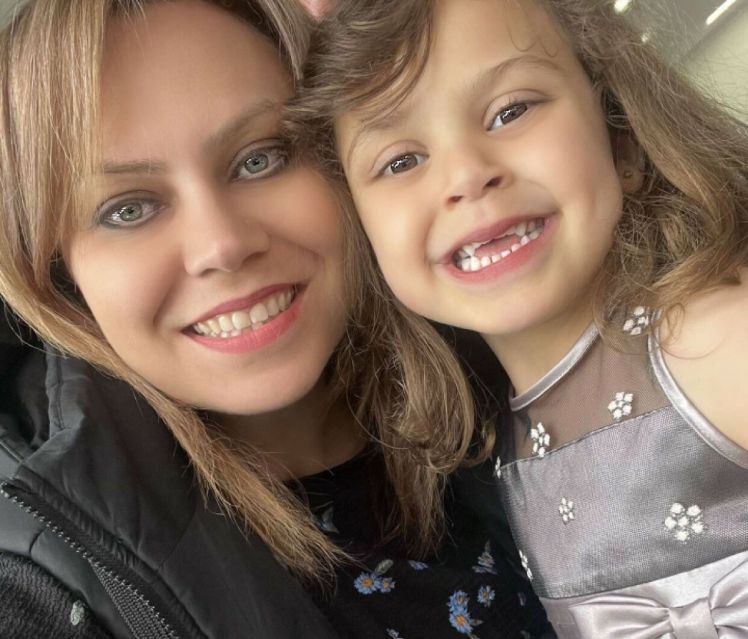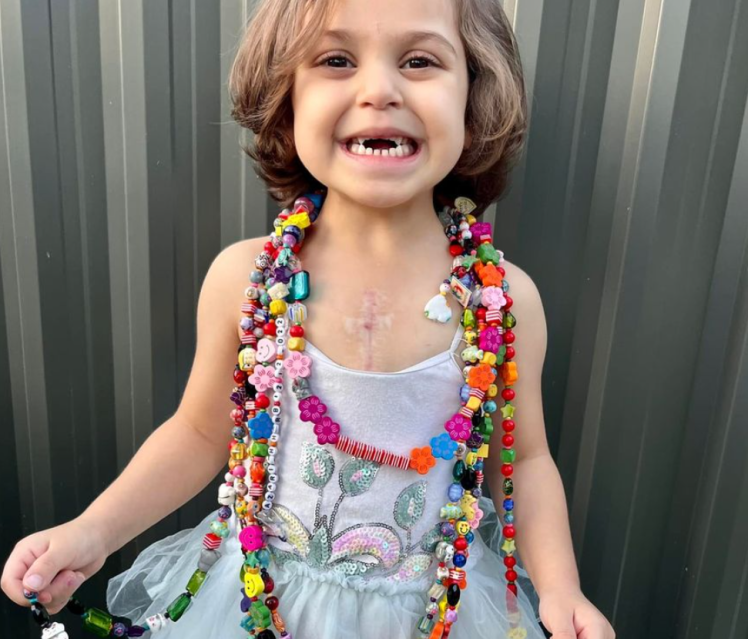At her 20-week scan, Sydney mum Joanna Harb was told that her baby girl had four heart defects and had very little chance of survival. But little Azariah has defied the odds from day one. This is her story.
When Joanna was pregnant with her second child, she was given the news no parent ever wants to hear.
“We went in for the 20-week scan and were so excited to find out the gender,” Joanna recalls. “The scan seemed to be taking a really long time. At the end, the doctor told us we were having a little girl with four heart defects and likely also a chromosome disorder.
“Our whole world came crashing down.
“From there, it was very doom and gloom. We were basically told to start planning her funeral as she probably wouldn’t survive. We couldn’t believe it.”
However, Joanna and her husband Paul refused to give up on their baby, who they named Azariah, and put a plan in place to continue with the pregnancy and save their daughter’s life.


Azariah was born at 38 weeks via emergency C-section and was immediately transferred to Westmead Children’s Hospital in Sydney.
The birth was incredibly traumatic for the mum-of-two from Sydney.
“My spinal didn't work so they had to put me to sleep,” Joanna recalls. “The next thing I knew I woke up in recovery with no baby, no husband and no phone. I didn’t know what had happened.
“Once I learned she had been transferred, I insisted on going to see her straight away.”
While Azariah was defying the odds from day one, doctors confirmed she had four defects: atrioventricular septal defect (AVSD), double outlet right ventricle (DORV), aortic coarctation (COA) and hypoplastic aortic arch. Each of these defects is complex and has its own individual challenges.
Azariah had her first open heart surgery, the Norwood procedure, when she was just six days old.
“There is nothing like handing your baby over to have heart surgery. I can’t explain it. It was gut-wrenching. The worst day of my life.”


Azariah with her heart beads from her first and second open heart surgeries. Each bead represents a procedure she underwent.
The first surgery lasted 10 hours, and when Joanne and Paul saw their daughter for the first time after the surgery, it was very confronting. They were told their little girl was very fragile and would have to take it ‘hour by hour’.
“She was on a ventilator. There wasn’t a part of her body that didn’t have a wire or tube coming out of it. She was all swollen and her chest was still open. We weren’t allowed to cuddle her or even touch her,” Joanna shares.
“But I didn’t care what she looked like, I was just so glad she was alive.”
While the surgery was a success, little Azariah was still extremely critical and had a lot of post-operative problems.
“Her body still had to fight, and she was just six days old. That whole period in ICU was a huge rollercoaster.”
In the end, Azariah was in hospital for two months before being allowed home.
By age 18 months, Azariah had undergone two more surgeries, a Glenn procedure and a gallbladder removal.
“Her second open heart surgery took place when she was four months old, and even though it was quite easy compared to the first, the trauma all comes flooding back,” Joanna admits. “Are we going to face the same complications?
“But we had no choice.”
Fortunately, Azariah tolerated her second surgery really well and it made her more stable. The little girl was able to live a relatively “normal life” and attend daycare with her big sister.
However, the issue of Azariah’s next surgery still loomed over the young family.


While the Fontan procedure was recommended, Joanne was determined to find a surgeon who would attempt a biventricular repair, meaning Azariah would have two ventricles, to give her little girl the best outcomes and longer life expectancy.
After many conversations and multiple more tests, Joanna found a surgeon who agreed to give the risky procedure a go.
“Azariah went into theatre on 12 December 2022 and did not emerge for 24 hours. It was an agonising wait.
“I was constantly told it would be impossible, but Azariah is a fighter. And her surgeon is just incredible. She walked out of theatre and said, ‘Your daughter made my career today'. She said it was the hardest surgery she's ever done, but it was successful.
“I owe her so much.”
In the end, Azariah was in theatre for 24 hours, on bypass for over 16 hours with her chest open the entire time, and then on extracorporeal membrane oxygenation (ECMO, a form of life support) and intubated for two weeks.
Her recovery was incredibly difficult and full of ups and downs.
“She had fluid build up on her lungs and ended up in ICU for five weeks. She was hallucinating and going through delirium. It’s been a massive journey, and her heart has had to adapt and learn to work in a completely different way.
“But we are now 16 months on and she’s doing really well considering everything she has been through. She will always be complex, and need more surgeries down the track, but she is our miracle and our little heart warrior.”


Joanna has been so moved by her experience, that she decided she wanted to give back to the community by working for HeartKids, an organisation dedicated to supporting and advocating for families impacted by congenital heart disease (CHD).
“When you spend so much time in hospital, you connect with a lot of other heart mums, and I just wanted to help and give back and offer support,” Joanna explains.
“I just want other CHD parents to know that they aren’t alone.”
"That they are part of a bigger community. We are all fighting the same battles.”
She is also passionate about raising more awareness about CHD, particularly in the antenatal stage when parents are given the diagnosis.
“I think there needs to be more awareness about CHD in general,” she says. “Not many people realise that one in 100 babies are born with CHD. And that we lose four babies every week. It’s far more common than people realise. We need more people to speak about it.”
She hopes that by sharing her daughter’s story, she will help others who may be struggling.
“As a heart parent, it’s an incredibly hard journey. Don’t give up. Ask questions. Seek support.
“Please know there is so much amazing research happening, at places like the Heart Research Institute (HRI), and please know there is hope. It’s an ever-changing world and there are so many options.
“I hope by sharing my daughter’s story I help even just one other person out there who may be struggling.”

How is HRI helping?
The Clinical Research Group is working on several exciting projects that will help to transform – and save – the lives of people with CHD.
With the Congenital Heart Alliance of Australia and New Zealand (CHAANZ), the Group is creating the National CHD Register to maximise the quality of life for CHD patients by providing the best of care for their life journey, by identifying deadly gaps in the healthcare system. This will be the largest compiled database on CHD in the world and the only resource of its type in Australia.
The Group is also conducting the world’s first randomised controlled study into the benefits of exercise for people with CHD. This information will then be used to develop guidance that can be rolled out across all corners of Australia via hospitals and telehealth services – including to remote areas and Indigenous populations that are at higher risk of cardiovascular disease.
Researchers from our Cardiovascular Regeneration Group, led by Dr Carmine Gentile, are working on an alternative to heart transplants using 3D-printed ‘mini-hearts’. The new technology creates personalised ‘bio-inks’ made of a patient’s own cells. These bioprinted cells form a ‘patch’, like a band-aid, which can then be used to replace the damaged tissue caused by heart failure that can stem from CHD.
